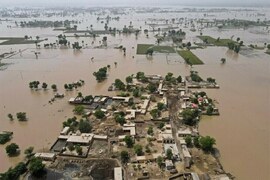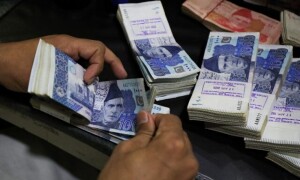Japan's economy shrank a record 4.0 percent in the first quarter as domestic demand and investment buckled, threatening to crush any export-led rebound later this year. The data did add to growing evidence that global trade may have bottomed out in the first quarter.
Net exports proved to be less of a drag on the world's second-largest economy than in the previous three months, and companies ran down inventory. While that lent support to the growing chorus of forecasts that the global economy was pulling out of the dive triggered by the financial crisis, there were grim signals on the outlook for Japan, where GDP is shrinking twice as fast as in the United States.
The GDP contraction was slightly less the 4.2 percent median forecast in a Reuters poll, but private consumption and capital spending fared worse than analysts had expected. Private consumption dropped 1.1 percent, compared with 0.8 percent in the previous quarter. The forecast was for a decline 0.9 percent. Capital spending shrank 10.4 percent versus 6.7 percent in the previous three months and an 8.1 percent forecast. "Weaker-than-expected figures for capex and private consumption suggest the negative impact from the export plunge is spreading to domestic demand," said economist Hiroshi Shiraishi at BNP Paribas.
Other economists forecast tepid growth through the year, saying a record $160 billion stimulus spending plan could boost consumption, which accounts for 55 percent of GDP. "Both exports and output are expected to rise in April-June. So I'd expect positive growth in the current quarter," said Hiroshi Watanabe, senior economist at Daiwa Institute of Research. "From July-September, stimulus packages will boost growth, so I expect the economy to continue recovering mildly for the rest of the year."
The contribution of net exports to GDP was minus 1.4 percent, less than the minus 2.0 percent forecast and minus 3.2 percent in the previous quarter. Inventories, which made a 0.5 percent contribution to GDP in the fourth quarter, detracted 0.3 percent. The decline in inventory may suggest that Japanese exporters are seeing demand in Western markets bottoming out after plunging in the wake of US bank failures and bailouts last year that nearly ruptured the global financial system. Industrial output grew 1.6 percent in March, the first gain in six months, another sign that the worst may be over on the export front.
Japan's heavy reliance on export industries for growth has seen its economy suffer more those of its peers, which took a much bigger hit from the financial meltdown that began in the US mortgage market. The US economy sank 1.6 percent in the first quarter (6.1 percent annualised) while the eurozone economy contracted 2.5 percent.
The decline in Japanese GDP, the biggest in records going back half a century, follows a 3.8 percent contraction in the previous three months. The yen tracked slightly higher after the data, to 96.07 per dollar while the Nikkei share average edged up 0.6 percent with the data in line with expectations.
BR100
15,235
Increased By
150.4 (1%)
BR30
44,824
Increased By
812 (1.85%)
KSE100
149,971
Increased By
1353.3 (0.91%)
KSE30
45,655
Increased By
407.2 (0.9%)






















Comments
Comments are closed.